Zaida Bergroth’s Tove (Finland’s 2021 Oscar submission), screenplay by Eeva Putro, stars Alma Pöysti (Xavier Picard and Hanna Hemilä’s Moomins On The Riviera) as Tove Jansson, the creator of Moomins and Krista Kosonen (in Denis Villeneuve’s Blade Runner 2049 with Carla Juri and in Bergroth’s Miami) as theatre director Vivica Bandler with Shanti Roney, Joanna Haartti, Robert Enckell, Kajsa Ernst, Jakob Öhrman, Eeva Putro, Liisi Tandefelt, Wilhelm Enckell.
During our conversation Zaida brings up a scene in Tove that she calls Aki Kaurismaki’s Paris, I remark that Lars von Trier’s Melancholia may have been influenced by the Moomins, and Alma Pöysti is quoted as saying “we are Moomin-marinated children.” We also discussed the work of production designer Catharina Nyqvist Ehrnrooth, composer Matti Bye, and the Benny Goodman, Glenn Miller, and Edith Piaf records to which Tove dances.
 |
| Zaida Bergroth with Anne-Katrin Titze: “I agree with you, that’s part of the Moomin charm, that they don’t shy away from the melancholy.” |
Tove Jansson’s (Alma Pöysti) life as an artist is connected to her oftentimes tumultuous private life, as it always is if you are a human being. The film focuses on three of her relationships, that with her father, Viktor Jansson (Robert Enckell), a famous sculptor; her married lover and eventually-to-be husband, the MP Atos Wirtanen (Shanti Roney); and her love for Vivica Bandler (Krista Kosonen), who had more influence on the interior landscape of the Moomins than anyone else in Tove’s life. The fact that she is not taken seriously as a painter, while her melancholic drawings for children conquer the world in daily newspaper comic strips, troubles Tove greatly. Vivica, who produces the first ever Moomin play on stage, will not commit to their relationship, despite all the passion between them. While what Tove thinks she desires is fleeting, many other opportunities present themselves. She takes on the challenge to figure out the best way to live, without giving in to too many pressures of what “the world” wants her to be.
From Helsinki, Zaida Bergroth joined me on Zoom for an in-depth conversation on Tove.
Anne-Katrin Titze: Hello Zaida!
Zaida Bergroth: Hello, nice to meet you!
 |
| Zaida Bergroth on Tove Jansson (Alma Pöysti) with Vivica Bandler (Krista Kosonen): “She wanted to have love in her life, but wanted to control that in a way. ” Photo: Sami Kuokkanen |
AKT: Where are you?
ZB: I’m in Helsinki in my little office, it’s 15 past 7 in the evening.
AKT: I’m in New York and it’s just after noon. I see the Tove poster behind you! Let’s start with the Moomins, did you grow up with the Moomins? Did you love them as a child or not so much?
ZB: Alma Pöysti, our actress, has a nice way to put it. She says that we are Moomin-marinated children. So we grew up with Moomin stories, they were read to us and we loved them, loved the animation. So yes, they were everywhere. I grew up with them and I even have a book by Tove Jansson and she signed it for me, so that’s my treasure nowadays.
AKT: So you met her?
ZB: I didn’t meet her but my grandmother sent the book to her and asked her to sign it. She even drew a little Snufkin on the first pages. It’s lovely!
AKT: It sounds lovely. Things come full circle with you making the film about her. The film starts in 1944, Helsinki is in ruins. One day in August, when Moomintroll arrived … It’s a powerful beginning. Was the choice to start in ’44 in the script?
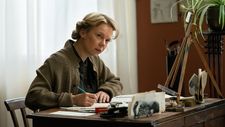 |
| Zaida Bergroth on Tove Jansson (Alma Pöysti): “I did a lot of research about what kind of music she loved and listened to.” Photo: Sami Kuokkanen |
ZB: Yes, that was in the script. She wrote her first book about Moomins in the time of the war; it was published in ’45. Those lines are from that book. It really was about dealing with the war, so it felt really appropriate to do that.
AKT: In all this joy, there is a darkness to her work, even in the Moomins. Shadows are lurking. When we see the play, there is a moment when they sing about the comet “It is long, it is gone.” I had to think about Lars von Trier’s Melancholia and was actually wondering if maybe Lars von Trier was inspired by the Moomins.
ZB: It’s a big nature catastrophe, was the way Tove described it. That was one of her themes in many of her stories. There is a big threat somehow. Yes, that’s how she dealt with the shadow of the war. I agree with you, that’s part of the Moomin charm, that they don’t shy away from the melancholy. They are joyful and they love life, but there’s always this other part to everything. Tove herself did suffer from depression from time to time. That’s why she tried to celebrate life even more. Joy was so important to her. She really believed that there is no way of doing anything creative, if there wasn’t joy.
AKT: It comes across in your film. She has to push for the joy. It’s not a by-product. She has to manufacture it in a way?
ZB: Yes, and you need to celebrate even if you see a small glimpse somewhere, you need to grab hold of it.
AKT: I liked very much how you used the studio. When we first see it, it’s in ruins, but it has high ceilings and the light is nice. Then the books and the paintings come in. It’s very prominent in the film.
ZB: From very early on I understood that this place is at the heart of our film. It’s her place, she works there, she lives there and very important things happen in there. I love how the work and love and everything is combined. We had a wonderful production designer [Catharina Nyqvist Ehrnrooth] who studied every little detail and she was able to build this wonderful place for us.
Tove was very hands-on, she found it when it was so cold, it was impossible to live in. Still she loved it because of the light. And that’s how an artist sees it. Of course, if you want to paint you need a lot of light. She wanted to dedicate her life to art, that’s the engine of our story. She wanted to have love in her life, but wanted to control that in a way. At that time, she knew if she was going to marry and have children, it would almost be impossible for a woman to continue her work as an artist.
AKT: She is told “Tove, you are not your paintings!” And she says “Yes, I am!”
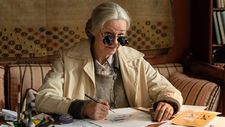 |
| Tove’s mother Signe Jansson (Kajsa Ernst); “She knew her mother was every bit as talented, or even more talented …” Photo: Sami Kuokkanen |
ZB: I love it! Yes! I remember when our producer suggested “Do we really need that?” And I said “yes, absolutely!“ Of course you can pretend that that’s not the case, but if you are doing something - and I relate to that very much - you’re putting all in and you can’t really save yourself.
AKT: You also are what you do in a way.
ZB: Yes, you are.
AKT: Your choice of actors is quite wonderful. I loved Alma Pöysti as Tove, and also your choice for Vivica. It’s funny, the past two weeks Blade Runner 2049 seems to be coming towards me. I just did an interview with Carla Juri. And here is Krista Kosonen, who was also in that film.
ZB: With Krista I had worked before. There is actually a poster of Miami behind me, where she is also acting in. I needed somebody who had that presence, the dominance also and who could be playful with it.
AKT: Be the dragon!
ZB: Yes, and embrace it and not be afraid, but really have fun with it. I think these two actors found a very lovely chemistry where there was humour and a lot of respect towards each other. I knew they had acted together before on the theatre stage under the direction of the famous theatre director Soldak, not an easy case in any way. And he happened to love these two. So they had this history together and I knew them to be very hardworking and very talented.
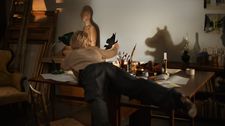 |
| On composer Matti Bye for Tove Jansson (Alma Pöysti): “With Matti we decided to go very delicate and capture what’s in her when she is creating.” Photo: Sami Kuokkanen |
AKT: I particularly like the scene taking place in Paris when they meet again and Tove seems to for the first time stand up for herself and say “No, I’m leaving.” The next scene is by the Seine, Tove says “I love you,” Vivica responds with “I love Paris.” Film history comes into play - there’s Gene Kelly with Leslie Caron and all those numerous Seine encounters.
ZB: Of course the situation last year was what it was and we were not able to travel to Paris so we had to shoot the scene in Turgut, which is a city in Finland. It has a nice river running across it. It wasn’t really what I imagined Paris to visually be in springtime, but we had, I call it the Kaurismäki Paris, if you know the Finnish filmmaker?
AKT: Yes, of course.
ZB: So these deep dark colours, a different kind of atmosphere, but I learned to love it, actually. I buy it as Paris.
AKT: Let’s talk about the choice of music. You have Edith Piaf, Benny Goodman, Glenn Miller. Was this from research that these were actually Tove’s favourite records?
ZB: I did a lot of research about what kind of music she loved and listened to. Edith Piaf was definitely one of her favourites. I also learned that she loved jazz and she loved dancing. So I had chosen these songs beforehand and I also gave it to the actor herself to get in the mood, as Glenn Miller’s song title is. It could create a lovely balance with Matti Bye’s score music. With Matti we decided to go very delicate and capture what’s in her when she is creating. It was nice to have all that energy and then go small in a way. I’m really glad that we did get that one Edith Piaf.
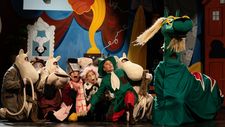 |
| Vivica Bandler directed Tove Jansson’s Moomins play Photo: Sami Kuokkanen |
AKT: C’est Merveilleux is not that famous a song.
ZB: No, that was the trick!
AKT: You focus a lot on the relationship with the father and their competition. He is also an artist, he gets the grants. Only after his death does she find out that he actually cared at all about her Moomins work. I read that her mother too was an illustrator and that she designed Finnish postage stamps. Tell me a bit about the parents please!
ZB: We needed to focus on some things. It’s a shame of course. Her relationship with her mother was very interesting. With her father it was very loving but dramatic and they had horrible arguments about politics and her boyfriends and especially girlfriends then. They all were very talented artists, but Tove knew what had happened to her mother who could not continue being an artist because she was the breadwinner. Tove had always seen that her father was this wonderful admired artist.
She knew her mother was every bit as talented, or even more talented, but she had to do what women had to do around that time. It’s one of the reasons why Tove didn’t want to get married and have children. She wrote to somebody “I would either be a bad mother or a bad artist and I won’t be a bad artist.” It was difficult to include some essential things in. There was this strange respect and competition that drove Tove. She was in need of her father’s acceptance. That affected her work and affected her painting. She wanted to get recognized as a great painter. That’s one of the most interesting things for me in this film.
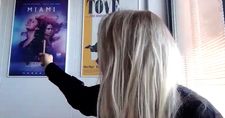 |
| Krista Kosonen also starred in Zaida Bergroth’s Miami |
AKT: I like very much how you show that she wanted to be recognized for something other than she was, namely the Moomins. I’ve seen the film a month ago, so I’m not totally certain about the context, but I wrote down “The monkey ate baby Jesus?” It was connected with the secret language between Tove and Vivica, but I lost context. Can you clear up my gap in memory?
ZB: Yes, the language was their secret lovers’ language. But the baby Jesus thing was an improvisation based on something that Alma Pöysti had read about the Jansson’s Christmases. So it’s based on something that happened but it was purely improvised when we shot it and then we decided to keep it because it was so funny and fit the scene so well.
AKT: Thank you for taking the time to talk!
ZB: Thank you, it was really nice!
Tove is currently screening in US cinemas.








![Tove director Zaida Bergroth: “We had a wonderful production designer [Catharina Nyqvist Ehrnrooth] who studied every little detail and she was able to build this wonderful place for us.”](/images/newsite/Alma_Poysti_600.jpg)














